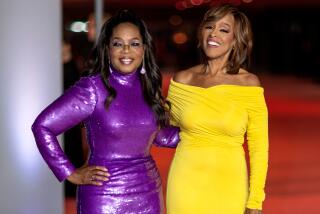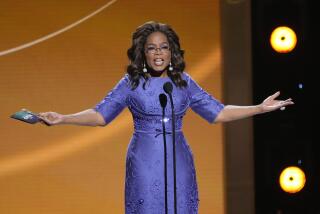Humiliation -- but on the Last Page, Absolution
Oprah Winfrey, whatever you think of her, made for remarkable television Thursday.
She delivered an hour that was both substantive and theatrical, featuring a lying writer, James Frey; his chagrined editor, Nan A. Talese; and two journalistic heavyweights, Richard Cohen of the Washington Post and Frank Rich of the New York Times, saying that the truth in our culture still matters.
But the star of it all was -- who else? -- Oprah Winfrey (she looked great, by the way), whose well-meaning, big-bucks Oprah’s Book Club had been duped in its embrace of the partly fabricated “A Million Little Pieces” as straight memoir. Now we would learn what happens when you cross Winfrey, when you go on her show and lie about your pain or your redemption and as a result get her whole Oprah empire behind you and your name is not Tom Cruise.
You get, basically, publicly stoned. And then in the end, Winfrey gives you absolution. And comes out smelling like a rose for being so aboveboard.
Somehow, though, Winfrey broke through her own artifice to deliver something unusual in our culture -- something real.
But first, the public stoning.
“It is difficult for me to talk to you, because I really feel duped,” she told Frey, who sipped his water and meekly acknowledged the liberties he took in his book. He seemed awesomely frightened. From his point of view, much of the hour must have felt like that scene in the film “Network” when anchorman Howard Beale gets summoned to a meeting with corporate honcho Arthur Jensen for on-air revelations about a company deal.
“You have meddled with the primal forces of nature, Mr. Beale,” Jensen says, “and I won’t have it. Is that clear?”
“Network” ended with the madman Beale being taken out on the air when his ratings fell.
This was a different kind of assassination, one of character, Frey being officially taken down by the woman who propped him up.
If that was the goal, Winfrey did it brilliantly. Because it was, on the one hand, self-serving and hypocritical of her. (Does she not foster “truthiness,” a buzzword that came up during the hour, in every group hug with the Hollywood A-list community?)
And yet it was one of those instances in which talk-show artifice dropped away, and nobody was exactly acting. It happened this month on “The Late Show With David Letterman,” when Letterman blurted at Fox News’ Bill O’Reilly: “I have the feeling about 60% of what you say is crap.”
But that was also a laugh line, not really meant to be probed. This was about Winfrey daring to reveal the fact that she isn’t omniscient, that her initial instinct was wrong when she made that ill-advised call-in to “Larry King Live,” supporting Frey after the scandal broke on the Smoking Gun website.
She kept Frey onstage for the full hour, as journalistic lions came on to deplore him to his face, to hold him up as a symbol of a bigger problem in the culture -- arguably described as a blithe disregard for what is truth and what isn’t.
“I mean,” Frey said in the end, apparently scared straight, “if I come out of this experience with anything, it’s being a better person and learning from my mistakes and making sure that I don’t repeat them.”
It was one of the few false moments of the hour, Winfrey ending the conversation as “Oprah,” offering redemption to a guy who had himself, apparently, peddled redemption.


